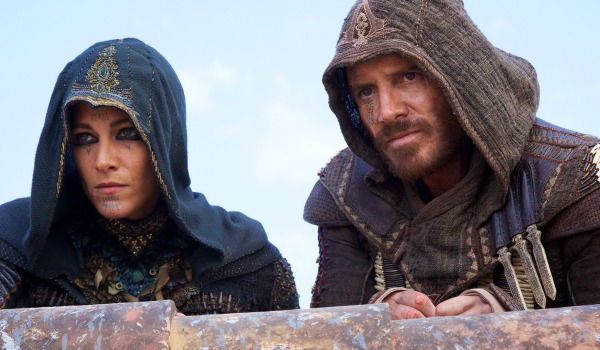There's always a point when the leeway you've been giving a film succumbs, and is replaced by a deluge of hate. I stuck in there with Assassin's Creed for as long as I could, especially since there's actually a lot to admire as the film finds its feet. Then, it fell apart.
Before I sat in my seat, I was quietly -- and, with the virtue of hindsight, naively confident -- about Assassin's Creed. Mostly because it once again brought together director Justin Kurzel and actors Michael Fassbender and Marion Cotillard, who collaborated so triumphantly on the bold and beautiful Macbeth. It was hoped that they could bring this same flair and magnetism to a big-budget production on Assassin's Creed. But the hope and promise of Assassin's Creed ultimately flitters away thanks to its underwhelming action, incomprehensible plot, and repetitive structure, and it ultimately only adds further weight to the curse of the video game theory.
In Assassin's Creed, Michael Fassbender takes two roles, the most prominent of which is Callum Lynch, a career criminal that's saved from his execution by Abstergo Industries, the modern-day incarnation of the Templar Order. Abstergo forces Callum to use the Animus, a machine that allows him to relive the memories of his ancestor Aguilar de Nerha (Fassbender) during the Spanish Inquisition. As Callum repeatedly uses the machine he gains the knowledge and skills to confront the Templars, who are also using Callum to map out where Aguillar left a priceless artifact that they can then use for a scientific breakthrough.
There's an obvious appeal to Assassin's Creed. 20th Century Fox undoubtedly was interested, as it gives them a chance to try and tap into the huge popularity of those that played the video game, while it also has a vague merging of The Matrix and Game Of Thrones. Plus, there's a richness and complexity to the story that should lend itself to cinema, especially with such a heady steam of creative talent involved.
Yet, Assassin's Creed never provides itself with the narrative backbone to keep moviegoers engaged, as director Justin Kurzel and writers Michael Lesslie, Adam Cooper, and Bill Collage leave too little explained for you to actually invest. At first, that's actually a plus, because Assassin's Creed isn't packed with the dreary leaden exposition that plagues so many blockbusters. As such, you give Assassin's Creed the benefit of the doubt, and you expect it to get us up to speed on its more intricate details later on in the movie. For the opening act that's fine, because as Assassin's Creed sets out, you find yourself nodding in approval at what it has to offer.
Justin Kurzel confidently embraces the scope and ambition of such a mammoth production, providing us with the requisite satisfying action beats in a sprightly manner, while still infusing Assassin's Creed with his own moody aesthetic and visceral style and voice. In particular during Callum Lynch's flirtation with death before Abstergo save him, while the scenes in the Spanish Inquisition have a misty, sepia toned color palette that inject it with a downtrodden grittiness.
Each new setting and location, from the Spanish Inquisition to California to Abstergo's headquarters in Madrid, has its own idiosyncratic look and texture, and you even get the feeling that you've gained access to the next level up when you arrive. At the same time, Michael Fassbender as the reckless Cal and Marion Cotillard as the enigmatic and emotionless Sophia Rikkin each tease additional depths, too. It's just unfortunate that when they're eventually delved into, you've long given up caring about.
The first signs of Assassin's Creed problems arrive in its first elongated action sequence. While it's not exactly all over the place, its geography and continuity is off, and what should be an invigorating statement of intent is just flat and underwhelming. Then it becomes very apparent that Assassin's Creed is just going to follow the exact same cumbersome structure every time Fassbender is put into the Animus, and it instantly becomes tiresome, while the action scenes once he's in there don't get any better as Kurzel's misty aesthetic just gets in the way.
The two worlds of Aguilar and Callum never merge into a visceral cognitive cinematic entity, and you don't get a sense of the physicality or genuine risk or repercussions to Cal going in. Yeah, we're told, and actually shown that Cal could die if he's over exposed, but Assassin's Creed is so wrought with a Hollywood yearning, which extends from its use of movie violence to its obvious pining for sequels, that you know he's going to be fine. In the blink of an eye, Justin Kurzel's impressive start and visual vitality gives way to a dank hollowness that saps the film of its enjoyment.
Then the explanation required to make Assassin's Creed move up a gear finally arrives and it is genuinely laugh-out-loud ludicrous, as it tries to incorporate one of the most preposterous MacGuffins in cinematic history into the fray, which instantly voids its integrity. Especially since those in Assassin's Creed proudly boast about the fact that the Animus project costs $3 billion and you're repeatedly shown just how meticulous and scientific its approach has been.
For the remaining 40 or so minutes, you'll be in a monotonous daze as Assassin's Creed slams the final nails into its own coffin with its chaotic yet humdrum finale that you lack the equilibrium to even comprehend, let alone enjoy. By the credits, you'll just be happy that the incomprehensible mess has come to an end, and you'll walk out slightly ruminating where both the film and the genre has gone wrong before instantly deciding that Assassin's Creed isn't worth one extra second of your time.












